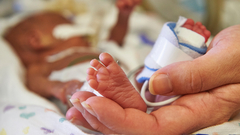Spina Bifida (Myelomeningocele)
What is spina bifida?
Spina bifida is a birth defect in which an area of the spinal column doesn’t form properly, leaving a section of the spinal cord and spinal nerves exposed through an opening in the back.
Spina bifida is the most common central nervous system birth defect. The most common and serious form of spina bifida is called myelomeningocele (MMC), in which part of the spinal cord and surrounding nerves push through the open bones in the spine and protrude from the fetus’ back.
Continuous bathing of the fragile developing spinal cord in amniotic fluid over the course of gestation is thought to result in progressive neurologic injury.
Why Choose Us?
The Center for Fetal Diagnosis and Treatment provides complete care for women carrying babies with known birth defects, from diagnosis and prenatal management through fetal surgery, to delivery and care after birth.
Symptoms of spina bifida
As with other birth defects, most myelomeningoceles are discovered by routine ultrasound between 16 and 18 weeks into the pregnancy.
The myelomeningocele lesion can occur at any level on the developing spine. Depending on the lesion’s location, myelomeningocele may cause:
- Bladder and bowel problems (incontinence)
- Sexual dysfunction
- Weakness and loss of sensation below the defect
- Inability to move the lower legs (paralysis) and other cognitive impairments
- Orthopaedic malformations such as club feet or problems of the knees or hips
Generally, the higher the defect is located on the spine, the more severe the complications.
In many cases, the brain develops an Arnold-Chiari II malformation, which blocks the circulation of cerebrospinal fluid, causing hydrocephalus (accumulation of fluid in the brain), which can injure the developing brain.
Spina bifida can lead to a variety of social and emotional challenges and lifelong quality-of-life issues.
Treatment for spina bifida
At Children’s Hospital of Philadelphia (CHOP), babies with myelomeningocele are delivered in the Garbose Family Special Delivery Unit (SDU), allowing for the highest level of immediate care for the newborn, as well as expert obstetric services for the mother — all within a leading pediatric hospital.
The decision of whether prenatal or postnatal spina bifida treatment is appropriate is influenced by several factors, including gestational age, the level of the myelomeningocele lesion on the spine, presence of the Chiari II malformation, and a number of important maternal health factors.
Postnatal repair of spina bifida
If postnatal spina bifida treatment is recommended or selected, your pregnancy is monitored — often at your home hospital — and a cesarean delivery is planned at CHOP at 37 weeks.
Traditional spina bifida treatment takes the form of surgical repair 24 to 48 hours after birth. Your child will undergo general anesthesia. A pediatric neurosurgeon removes the MMC sac, if one is present, and closes the surrounding tissue and skin over the defect to protect the spinal cord. After surgery, your baby will receive care in our Newborn/Infant Intensive Care Unit (N/IICU).
Prenatal repair of spina bifida
Fetal surgery for myelomeningocele is a delicate surgical procedure where fetal surgeons open the uterus and close the opening in the baby's back while they are still in the womb. Fetal spina bifida surgery is shown to offer significantly better results than traditional repair after birth. Because spinal cord damage is progressive during gestation, prenatal repair of myelomeningocele may prevent further damage.
Mothers carrying a baby with myelomeningocele who choose fetal surgery for spina bifida require the most expert and carefully coordinated care, from the time of diagnosis through care after your baby is born. Our team has performed a high volume of fetal surgeries on babies with myelomeningocele, maintaining optimal patient safety and following high standards for prenatal myelomeningocele repair to ensure the best possible outcomes for you and your baby.
If your unborn baby has been diagnosed with myelomeningocele and you are a candidate for prenatal spina bifida treatment at Children’s Hospital of Philadelphia, the surgery is performed between 19 and 25 weeks of gestation. Prenatal repair requires a significant commitment on the part of the mother and her support person.




